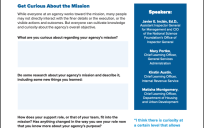Although some would say that numbers are the devil’s letters, the truth is that data is the lifeblood of modern organizations. So how can you get on board the data express and start using analytics to strengthen your arguments, upgrade your processes and improve your results?
On the GovLoop online training “Data Analytics for All,” former Fontenot Strategic Consulting Founder Brodi Fontenot shared his expertise on data in an easy-to-understand manner that made data analytics feel accessible to all.
One does not have to be a trained data scientist to put data to work. Any public servant looking to make their presentations snappier or their proposal stronger can call on the power of simple analytics.
When writing a report, data can be implemented to paint a more compelling picture or make a more effective argument. Data can create content that resonates and is easily consumable. For example, a complex idea can often be distilled down to an easily digestible graph or chart.
The question that Fontenot said ought to guide the use of basic data analytics is, “how can I tell the simplest story possible with the data available to me?”
A compelling narrative supported by relevant data makes for a strong presentation, report or speech, and there’s nothing keeping you from putting the two together.
Simple data analytics has a wide variety of applications. According to Fontenot, it can help you recognize patterns, suss out problems, and evaluate outcomes and effectiveness.
So what’s keeping every employee from becoming a data wizard? Fontenot identified several barriers that agencies may face when attempting to become more data driven.
First of all, there can be issues with data sharing, whether that’s between agencies or between departments within the same agency. Making sure that the right data is available to those who need it is key for agencies looking to enable their employees.
Another potential issue is training; employees may be eager to start using metrics in their reports, but they need a basic understanding of data analytics in order to be effective.
In addition, government agencies often face unique issues surrounding privacy and legality; they hold vast amounts of sensitive citizen data and may have to prioritize security over usability to protect it.
The final issue is an obvious one: With so much data, it can be hard to determine what is high quality and reliable and what is not. By choosing datasets that you are confident in, you can ensure that the metrics you are using are accurate and meaningful.
So how do you get started with data analytics? Fontenot suggests the following: Find a problem that your team has trouble explaining and see if data can help you look at it in a new way. You might be surprised by the insights that data can unlock, and you’ll get hands-on experience using it to problem solve and improve processes at your agency.
So, experiment, learn and gain confidence in your data analysis skills. You’ll develop an important professional skill, and your agency will reap the benefits too. As Fontenot said, “It’s not about data analysis for data analysis’s sake, it’s about making better decisions.”
For more free content, career resources and training related to the 2020 NextGen Summit, be sure to check out our website, found here. GovLoop, Young Government Leaders and hundreds of public servants will come together on Wednesday, July 22-23, 2020, at the Marriott Marquis Downtown DC Hotel for two days of training and leadership opportunities, innovating and networking. Will we see you there?





Wow! I had never thought about how data could be so universally useful. Thanks for sharing, Spencer!